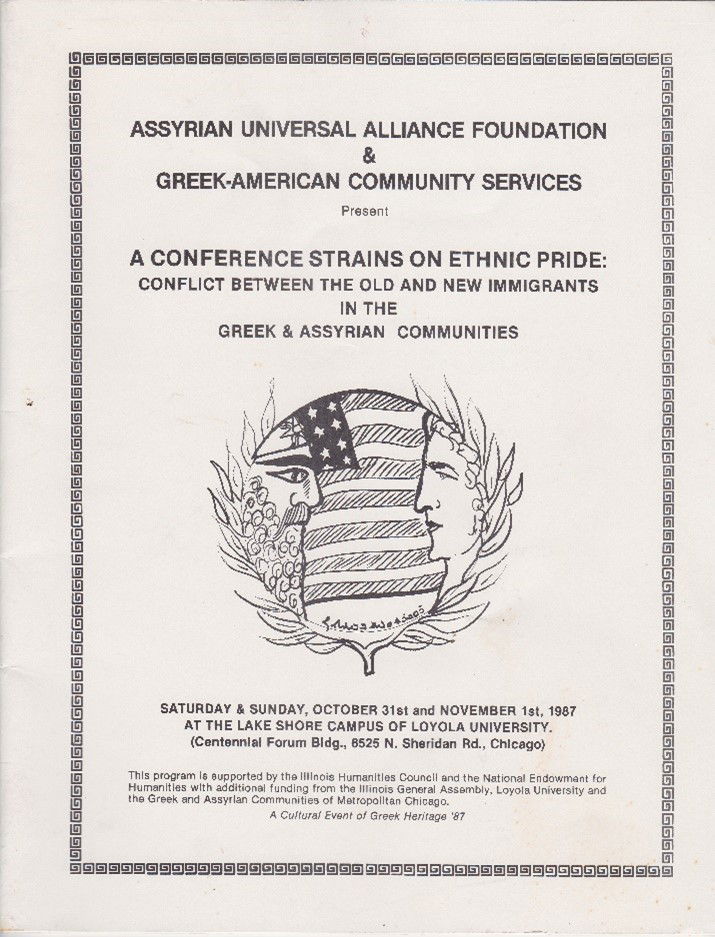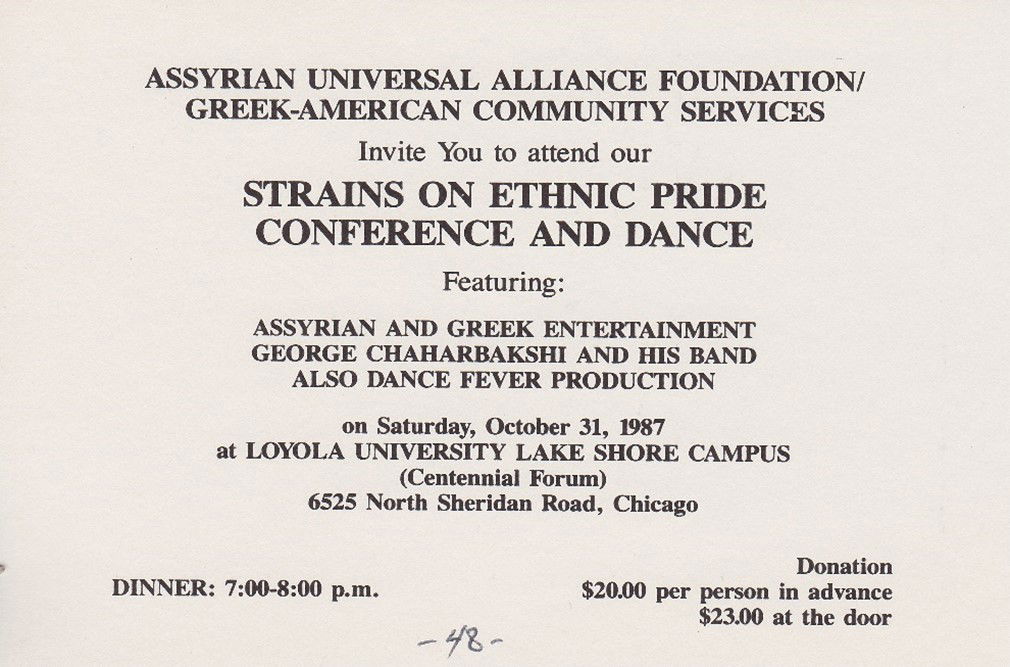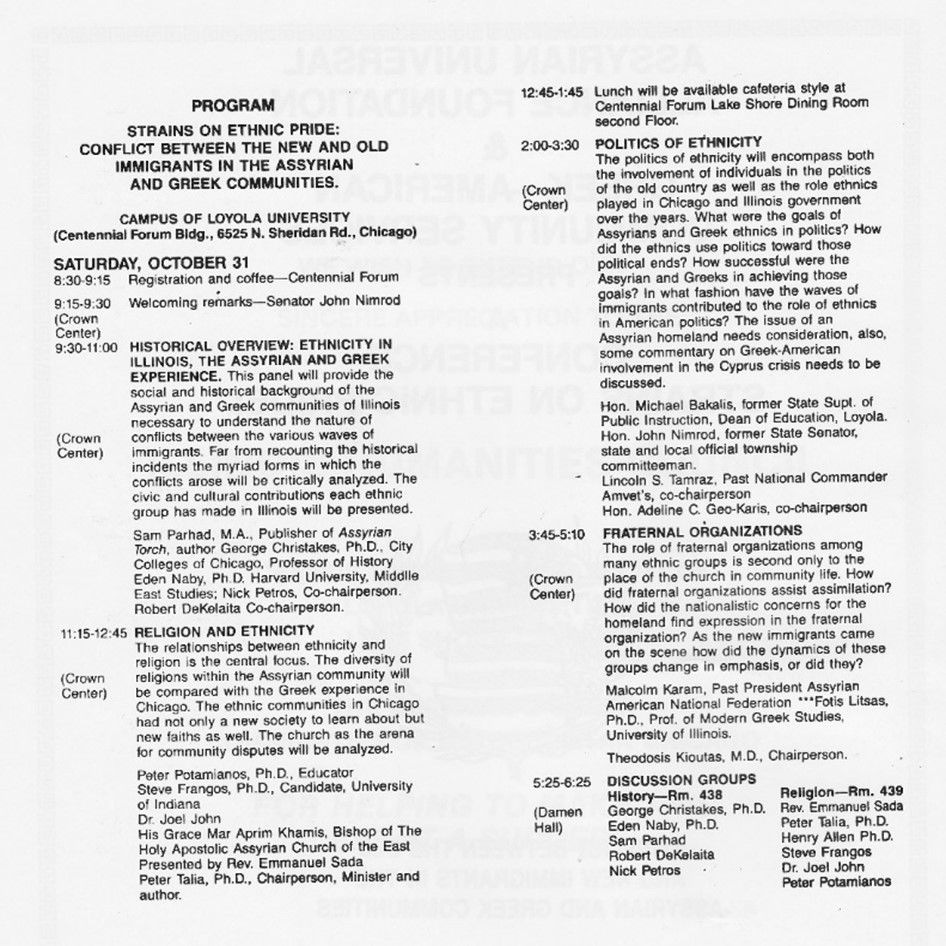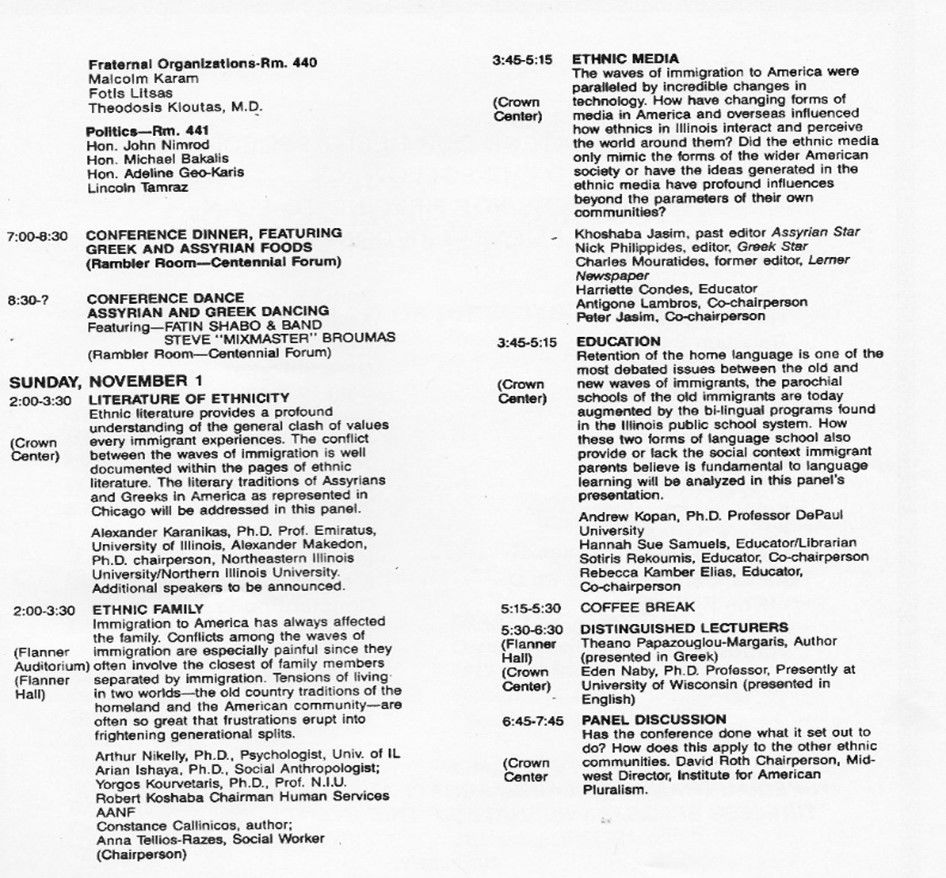Strains on Ethnic Pride: Conflicts Between the Old and New Immigrants in the Greek and Assyrian Communities
From Working to Preserve Our Heritage: The Incredible Legacy of Greek-American Community Services:
“After the successful 'Greeks in America' film series and the ongoing Fabric Arts of Greece project, GACS began to plan for its next cultural program. Elaine had become aware of a grant opportunity offered by the Illinois Humanities Council (IHC). The proposal was to organize a conference that would focus on the differences and conflicts between the waves of Greek immigrants and compare and contrast those experiences with those of the Assyrian community.
The Assyrians were selected in large part due to the relationship between GACS and the AUAF that evolved during the Assyrian Project for the Elderly. Elaine had begun to work for AUAF in developing programs and writing grants to fund these programs. They were also one of the newest immigrant/refugee groups in Chicago. Steve Frangos remembers that one of the reasons he thought the grant would be funded was that at the time, few knew who the Assyrians were, and the state would likely fund a project that provided a greater understanding of their history and culture.
Elaine recalls: 'Steve worked on this grant on my computer in the basement of the 53 Regent Drive house. What an experience! I think it was the year the Chicago Bears won the Super Bowl, and we were working on the grant rather than watching the game. I did buy a cake to celebrate. We had about 150 people in attendance at the conference. The conference was not so much about generational differences, but about the strains felt between the first wave of immigrants and their children, and the second wave of immigrants, although we did cover so much more, including generational differences.'
Steve, Elaine, and I wrote the proposal. The initial idea evolved from a one-day event into a two-day conference that would include 40 speakers who addressed the theme of the conference; 'Strains on Ethnic Pride: Conflicts Between the New and the Old Immigrants in the Greek and Assyrian Communities.' The Illinois Humanities Council funded the project for the maximum grant amount of $10,000. The event was held in the Centennial Forum Building at Loyola University’s Lakeshore Campus. In this beautiful setting overlooking the lake, speakers and participants explored tensions between the various generations of immigrants within these communities.
The aim of the conference as detailed in the grant proposal to the IHC stated:
'The proposed conference, ‘Strains on Ethnic Pride: Conflicts Between the Old and New Immigrants in the Assyrian and Greek Communities of Illinois,’ will focus on one of the most pressing contemporary issues of ethnicity in America – how different waves of immigrants from the same ethnic group are in open conflict over the proper ways of expressing their identity. Individuals of an ethnic group possess more alternatives for expressing their identity than the ones they finally choose. Such cultural and social selections vary not only from ethnic group to ethnic group or even within a particular group but between each generation of all immigrant Americans as well. The complexities of the ethnic reality, far from dry academic case studies, are live compelling community issues faced every day by these people. The resulting tensions and open disagreements over competing versions of being ethnic in America – which are the direct consequence of these cultural and social selections in the new land of America – are so intense and volatile that the resolution of these problems often seems virtually impossible.
This conference will directly address these conflicts as they enact and so express the varying ways of being Assyrian and Greek in Illinois. The community organizers of this proposal feel assured that such a public forum where the contrast and comparison between Assyrians and Greeks are a central feature will allow the respective communities to see beyond their own specific disagreements to the larger issues which inform and in part give structure to the social conditions over which the intra-community disputes now range.
The conference will be scheduled over two days. Eight topical areas spanning community institutions and expressive forms will be the thematic areas around which the panelists will organize their presentations. The structure of each panel will remain the same: there will be two to four speakers per panel each allotted twenty to thirty minutes for their paper. A chairperson will direct and conclude the panels, acting as a discussant summarizing the themes and issues of the speakers. Immediately following the chairperson’s summary, there will be a minimum of thirty minutes of open floor discussion and debate. Community concerns dictate the Ethnic Family panel (scheduled for the entire afternoon on Sunday) be an extended forum. The discussion period following this panel will also be extended.
Given the desire to have the panels represent both the Assyrian and Greek communities, it seems too complicated to have any language other than English spoken during the conference presentations. However, in response to community sentiments, a distinguished lecture will be held on the second evening of the conference. The two lectures will be held simultaneously, one in the Assyrian language and the other in Greek. This will of course exclude various persons attending the conference. But English will do the same. The thematic topic of the distinguished lectures will be the ethnic’s sense of estrangement in the new land. In Greek, this notion is covered by the term xenitia and in the Assyrian experience, the word kariboota describes this sense of loss. Therefore, to provide some balance to the otherwise entirely English language program this one has been conceived.'
Conference speakers and moderators included: Dr. Henry Allen, Dr. Michael Bakalis (Loyola University School of Education) (conference master of ceremonies), Constance Callinicos, Dr. George Christakis (City Colleges of Chicago), Harriett Condes, Robert DeKelaito, Rebecca Kamber Elias, Steve Frangos, John C Geocaris, Senator Adeline Geo-Karis, Dr. Arian Ishaya, Peter Jasim, Dr. Joel John, Malcom Karam, Dr. Alexander Karanikas, (Professor Emeritus, University of Illinois), His Grace Mar Aprim Khamis (Bishop of the Holy Apostolic Assyrian Church of the East), Dr. Theodosis Kioutas, M.D., Dr. Andrew Kopan (DePaul School of Education), Robert Koshaba, Dr. Yorgos Kouvetaris (Northern Illinois University), Antigone Lambros, Dr. Fotios Litsas (University of Illinois at Chicago), Dr. Alexander Makedon (Northeastern Illinois University and Chicago State University), Theano Papazoglou Margaris, Charles Mouratides, Dr. Eden Naby (University of Wisconsin – Madison), Dr. Arthur Nikelly (University of Illinois – Champaign/Urbana), Senator John Nimrod, Sam Parhad, Nick Petros, Nick Philippidis (Greek Star), Dr. Peter Potamianos, Anna Tellios-Razes, Sotiris Rekoumis, David Roth (Illinois Ethnic Consultation), Rev. Emmanuel Sada, Hannah Sue Samuels, Peter Talia, and Lincoln S. Tamraz.
In addition to Loyola University, event co-sponsors included: Ashurbanipal Library, Assyrian National Aid Society, Congress of American Hellenic Organizations, Greek Women’s University Club, Hellenic Cultural Organization, Hellenic Medical Society, Hellenic Museum and Cultural Center, Hellenic Professional Society of Illinois, Hellenic Society of DePaul University, KRIKOS, Northeastern Illinois University Greek Club, and the United Hellenic American Congress. Tape recordings of the conference were given to the AUAF for deposit in the Ashurbanipal Library, a library focused on Assyrian culture and history.
At its conclusion, this groundbreaking conference drew high marks for its candid and engaging conversation about the strains between the earlier immigrants and those who came later within our communities as well as a broader comparison between the Greek and Assyrian cultures. This example of cross-cultural cooperation would become a model for future GACS Cultural & Arts Program undertakings."



